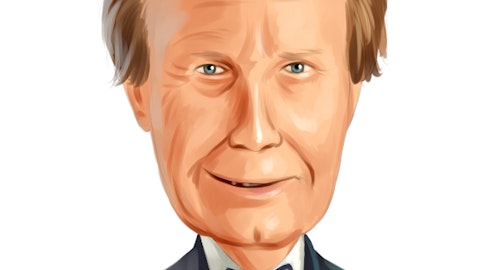John Kibarian: And the $100 million of bookings that we discussed on the call, Christian, you might have missed was it for Q4. So it’s what Adnan is referring to is the value at the end of Q3. So you would take that booking and make it additive to that backlog number.
Christian Schwab: Excellent. Okay. Perfect. That’s where I was slightly confused. And then I appreciate, I think in the beginning of the prepared remarks, I think you guys were going to wait one more quarter to given the situation in China and slowdown in dislocations, certain high-volume markets that the semiconductor industry is facing. That being said, we started the year thinking that we were at 20% to 25% business. We’re going to end up at 30%. We’ve added new partners. We’ve just talked about big huge deals, and we talked about the huge bookings as they’re going to happen in Q4. I mean as a baseline, I assume it’s safe for us to still think about 20% to 25% for 2023.
John Kibarian: Yes. I mean, at this point, Christian, we really we are we normally would give this perspective in our February call, and we still want to and that would be in the year where there’s kind of more visibility. This is a pretty crazy year. I jokingly said I like our house. I’m not sure about the neighborhood. When you just look around, we don’t know how that stuff isn’t going to affect us at some point. So far, it hasn’t. We had obviously a great year on the progress we had a great year. So we are just being cautious. If I were, we’re not changing our internal models. I don’t know why someone would change the models on the outside yet until we get a little further along. It’s very easy to just go back and change them because I understand what you’re talking about, it’s all €“ when you look at our pattern, it’s very positive and it’s easy to get excited. But at this point, prudence maybe to not change things until we understand more about the world.
Christian Schwab: Great. And then my last question is just for the clarity on China. So, you have limited exposure on leading-edge Memory or Foundry, Logic customers where a lot of €“ well, where the government has stopped the ability of U.S. companies to work with. Did I hear that correct, first? And roughly, of your Chinese exposure, speaking nationalistically, not non-Chinese manufacturers have facilities there who already have received this but nationalistic Chinese-based companies, do you have a rough estimate of your exposure to the leading-edge?
John Kibarian: Yes, we do. We believe that we’re relatively insulated from the leading edge on that piece. And we do €“ but we do look at a place where our own team had forecasted selling into leading-edge facilities that we have to go back and look at. I think the bigger factor than whether we can sell or not and what we can do or not is if you can’t get lithography systems, if you can’t get , if you can’t get deposition tools, and there’s not a lot of data analyzed and there’s nothing you can run a vehicle through. So we think that’s going to change, and we’re already seeing the way customers are reacting a little bit. We believe they’re going to pivot a lot more to mature nodes where their ability to execute is on fettered€”and they’re able to execute, as you can see, by nature of our Gainshare report this quarter.
So we expect that naturally, the market is going to pivot that way. We’re still waiting to see. That would be very good if that happened. We’re still waiting to see. But we €“ these are practical business folks over there €“ they’re going to tilt that wind mills if they can’t execute





